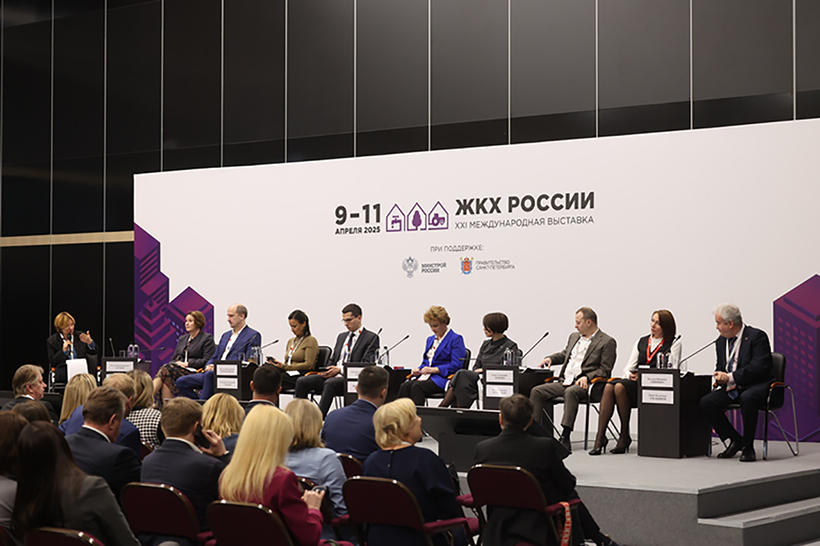
Day 1 of the 22nd Municipal Housing Complex of Russia International Exhibition included a round table discussion named IMPROVING MAINTENANCE AND SERVICE IN APARTMENT HOUSING: CHALLENGES AND SOLUTIONS.
In her welcome speech, Olga Serdyuk, First Deputy Executive Director of the United Municipal Housing Board, Association of Municipal Housing Complex Companies remarked that the subject on the agenda is both relevant and urgent. Mrs. Serdyuk specified that quality of apartment housing management is not only a guarantee of a comfortable environment for its residents — it is also an essential competitive advantage for the house itself. Evgeny Kolmogorov, Deputy CEO at the Union of Russian Cities agreed that the issue of apartment housing management and maintenance in cities is one of the most important issues. He mentioned that the Union of Russian Cities with its 102 members is working hard to consider the matters related to apartment housing management and maintenance. Unfortunately, so far they haven’t formulated a common attitude to be presented to governors of cities.
Sergey Pakhomov, Chairman of the State Duma Committee for the Construction and Municipal Housing Sector, addressed the audience with his words of welcome, too. He stated that enhancement of apartment housing maintenance quality is one of the most hot issues for citizens. Further, he specified that this problem required an expert approach indeed as such high-class discussions tended to result in remarkable and prospective insights. One of the most crucial topics in the sphere of apartment housing management and maintenance is (according to Mr. Pakhomov) bringing back the state control, development and introduction of activity regulations for managing companies, along with economically transparent mechanisms of tariff making, which both residents and managing companies would be pleased with.
Boris Khmelnikov, CEO at the Research and Development Centre of Municipal Economics explained that economical guidelines of a managing companies should be based on the house’s economics, which in its turn is underlain with a technical policy — a plan of maintenance and repair of public property in an apartment house, and estimations called to discover how much money it requires. At the same time, Mr. Khmelnikov feels certain that economics of an apartment house must depend on its operation standard — a list and a schedule of the works required, which is dictated by the financial status of an apartment house’s owner. Unfortunately, the minimal list of maintenance works for apartment houses was compiled as early as in the Soviet times, which makes it irrelevant in the current situation. Boris Khmelnikov has no doubt that to improve the management and maintenance quality, every immovable property must have a customized operation guide, and the management contracts shall be signed for at least 5 years. Tariffs for maintenance of public property in an apartment house shall be calculated in compliance with uniform federal method guidelines that will be mandatory for everyone, be it a house owner, a managing company, or a local government agency. Thereat, Mr. Khmelnikov presumes that managing companies and local government agencies must estimate economical parameters of a house together, while maintenance tariffs for every single apartment house shall be economically justified.
Irina Gentzler, Director of the Municipal Facilities Department at the Institute for Urban Economics Foundation stated that introduction of uniform standards to control all activities related to management of apartment houses and their maintenance is one of the events outlined in the Development Strategy for the Construction Sector and the Municipal Housing Sector of the Russian Federation by 2030 with a forecast by 2035 attached. However, they still haven’t got even a draft concept for these standards. This means that residents of apartment houses have no idea what this “public property maintenance in an apartment house” means, what works and services are needed, and how they can be controlled. At the same time, managing companies don’t know how to justify their pricing proposals, how to make reports about the works performed, and how to show the results. “Residents and managing companies can’t reach an agreement, but it is the house that is the party harmed,” Mrs. Gentzler made her point. She shared that the Institute for Urban Economics Foundation had already compiled a document named “Apartment house management standard for residents and managing companies,” which was positively taken by representatives of the residents community, homeowners associations, and housing associations. Still, it is unclear what managing companies think about it. “Residents are willing to use such standards, but the question is if managing and operating companies will agree to that,” Irina Gentzler concluded.
One of the ways to improve life standards in an apartment house and help its residents spend less on payments to resource suppliers is use of alternative energy sources, which all the participants of the discussion agreed. Alexander Maslov, Director of Green City Company, provided examples of quite a few residential developments that have solar panels embedded into their facades. According to Mr. Maslov, this solution helps cover up to 30% of the houses’ needs for electric energy and can be used both in residential houses and industrial facilities.
Natalia Nevmerzhitskaya, Chairwoman of the Board at the Association of Guaranteed Suppliers and Energy Service Companies agreed that today there are several trends of using advanced energy technologies in apartment housing, and operation of renewable energy sources is one of them. Still, she had to remind the audience that while solar generation was the most evident solution, it cannot be used on a large-scale basis due to effective restrictions as regards to microgeneration in apartment houses.
